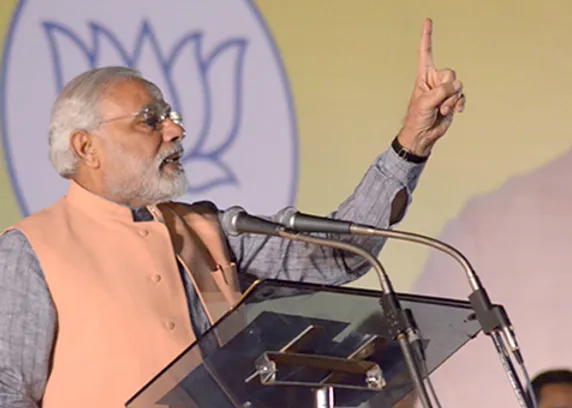Convinced that the Congress government with its well-honed brand of crooked playing fields and “stash-the-cash” is soon to be replaced by an angelic BJP government led by Narendra Modi, corporate honchos (many of whom were the givers of cash in exchange for favours from the Congress), the financial services community, and the media are waving the “time-to-buy India” flag. With the market already having had a run up and the INR gaining ground, we are sceptical.
We hold no brief for the Congress and its arrogant brand of distant politics. We would probably empathise with the view that the Congress should have been disbanded after having won the battle of Independence against the British in 1947. With the job of leading Indian to freedom over, maybe another group should have governed India. But neither do we understand the fuss over the Messiah-like Modi Miracle.
And when Barron’s places India on a cover story with “India: Open for Business – and investors” and characterises Modi as the possible next Reagan, we are numbed. Our brain refuses to send any signals to our paralysed limbs. We stand aghast at the first turning of the second stair – for what we see when we turn below is ‘the deceitful face of hope and of despair’: something akin to the Congress government.
Another BRIC-like delusion?
The Barron’s article - and others that have appeared in Canada and Europe – all seem to echo the same false tunes:
- Congress is socialist, BJP is not;
- Congress was scam-tainted and BJP is not;
- Congress is inefficient and BJP is not;
- Congress failed to unleash the India miracle, and BJP will.
Don’t get us wrong: India is a great place to invest – with certain sensible, valid, long-term assumptions. But we fear we are back in the Goldman fantasy of BRIC. That myth was Made in USA and lapped up by Indians. This 3M myth of Miracle Messiah Modi is home grown, bought by foreigners.
The reality of India is:
- There is poverty: over 250 million people don’t get enough to eat every day and maybe another 300 million may not have proper homes to live in and clothes to wear. Is the solution to ignore them? Or is the solution to bring them all at the mercy of a market economy? We have argued for decades that the responsibility of bringing these less fortunate up the economic ladder is that of the government. There will effectively be a tax on the richer classes of society to pay these bills. There is no alternative.
- Yes, the way subsidies are distributed is inefficient and corrupt. What has the BJP done about that in the 8 states ruled by them? You cannot stop subsidies – but one needs to ensure they reach the correct people. Subsidies, in fact, are a booster to the economy. Even the Barron’s article admits this by pointing out that rural incomes have been surging over the past few years – though it gives no credit to the “socialist” Congress for this. Rural incomes surged because the Congress government came out with more subsidies and programmes for the poor, not because the Ambani and Adani business houses (supposedly close to the Modi government) created millions of jobs from some investment programme. Did all the money reach the poor? Definitely not. But that is a question of efficiency and minimising corruption. When the milk to the baby leaks out of the bottle, do you stop feeding the baby its much-needed milk? Or do you fix the nipple in the bottle to stop the leakage?
- If the BJP is so capitalist, why are they blocking the entry of retail giants Wal-Mart and Tesco? The Congress government has allowed FDI in retail and left it to every state to decide whether they welcome or reject foreign investment. There are 8 states ruled by the BJP in India and only 1 of them has agreed to allow FDI in retail. And Barron’s assumes that India will be “open” under a BJP government?
- While the Congress may have mastered the art of the scam (notably, many of the children of the senior members of Congress have attended The Ivy League schools so they are as “sophisticated” as any Wall Street firm in the Art of the Steal), the BJP has its own rustic version of scams. You know the greasy, dirty stuff: grab land and excavate the sand, iron ore, and whatever else you can. The children of the BJP have yet to attend the US universities to master the art of the electronic and elegant frauds! In four years they will have their degrees and follow the Masters of the Universe.
A Reagan or an Obama?
Meanwhile, it would seem that the Modi wave is similar to the pattern followed by the Obama wave: (i) a distrust of the failed incumbent, (ii) a desire to latch on to someone different, and (iii) good oratory skills that avoid the specific, and (iv) a general drift and lack of leadership from a good orator who builds a mediocre cabinet.
In light of the reality of India, the statement that a BJP-led government could be a Reagan-like Administration is a stretch. If the BJP did take those imaginary steps of reducing subsidies and leaving 50 years of bad planning to free markets to resolve, it would be hounded from power within a year.
The chances are that a future Modi Administration may end up more like an Obama regime: one of high expectations and low delivery where many supporters would like to press the CTRL ALT DEL button, as would President Obama.
We are neither BJP-haters nor Congress-lovers: we are realists and understand the limitations of any government. There is no magic wand, there is no silver bullet. India took 50 years to dig itself into a hole. And while the Congress can be blamed for much of the past failures, the BJP was equally guilty of living in a time warp – with the benefit of not being in power to execute the bad ideas and take the blame for it. I recall a meeting with “a leading thinker” of the BJP in the early 1990’s, where he was criticising the reforms of the Congress in 1991 and wondering why on earth multinationals should be in India making biscuits. Or bread. That, the leading thinker of the BJP said, was the role of the government: a clear indication that the “nationalist” BJP would have also dug India into a hole if it had been in power.
Show me the numbers.
The BJP’s plan to build 100 cities is great: India needs them. There is no disclosure on what each city will cost to build and how it will be funded. That is a typical political statement and reminiscent of the Goldman thesis for India: the young people will work and will make India a superpower.
“And how”, we asked the Goldman team on their visit to India, “will the young get jobs”?
“Aha, they responded, “the government will put in place policies to create jobs”.
We read T. S. Eliot’s Ash Wednesday and prayed: “O my people.”
Today, there are reports from every sell-side house asking “where are the jobs?” and questioning if India’s Demographic Dividend is a potential Demographic Disaster.
No, this 3M Messiah Miracle Myth stuff smells like that BRIC hype – but the creation of this version has been outsourced to India.
So how will the BJP fund these 100 cities? Let’s assume that it costs USD 25 billion to build a city to house 1 million people, about USD 25,000 per inhabitant. One hundred cities will require USD 2.5 trillion which is 5x India’s annual domestic savings and about 2x of India’s annual GDP. So, will these cities be built in 5 years, 10 years, or 50 years? Sure, we give the BJP full credit for specifying they wish to build 100 cities – as opposed to 99 or 101. But, is there XL sheet as unreliable as the Goldman fantasy of India’s Demographic Divided?
Why we love India.
Within this overall madness and hype, there is a real economy with real growth and great investment opportunities. As Barron’s noted, the average Indian has little food, few clothes, few cars or bank accounts. The potential is immense, but India will canter, not zoom.
There are serious businessmen building serious businesses within the confines of a bad bureaucracy, illogical regulators, and a misguided political class. (No, we are not talking about the US or France.) The challenges we face is to identify these managements, understand the risks they are taking and assess the valuations at which we are willing to use client capital to fund these long term business plans by being investors and shareholders.















